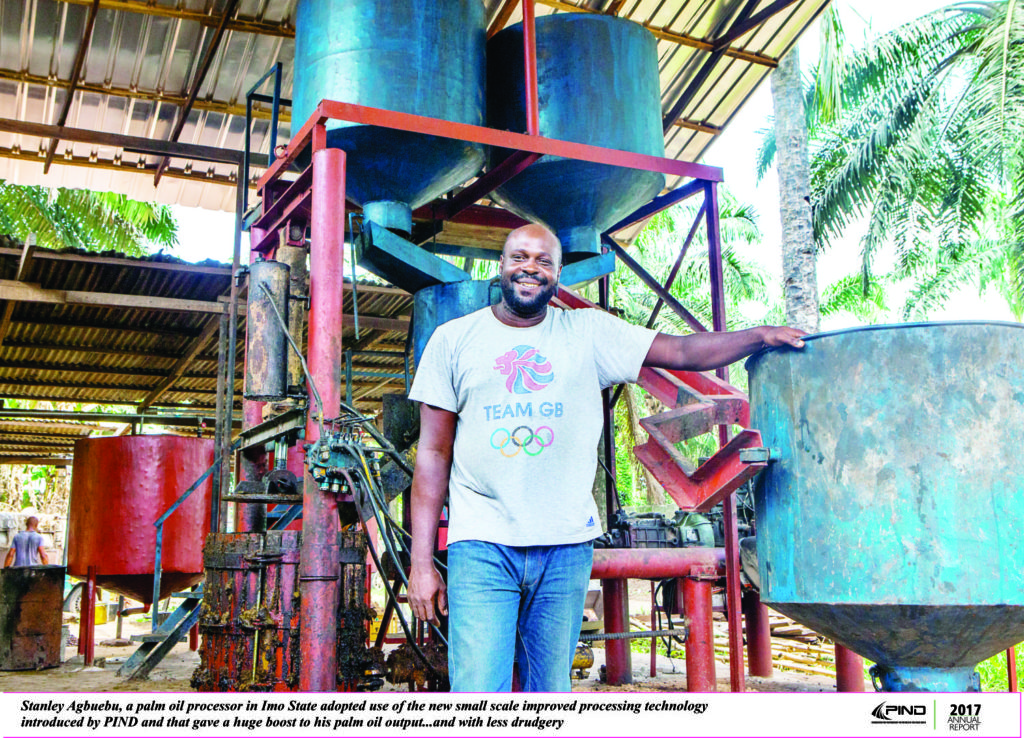 Stanley Agbuebu has been a palm oil processor in Imo State for more than 20 years.
Stanley Agbuebu has been a palm oil processor in Imo State for more than 20 years.
‘’I started from using the local mill’’ he recalls. ‘’We cook the palm fruits ten foot from the ground. From there we will call people that will carry it to the place that they are going to digest it. From digestion, we proceed to where we will process it and from there we will extract our oil. It is labor intensive, and the cost is too much’’.
This drudgery was not limited to Stanley alone. It was the bane of processors like him across the region. So when he encountered the Small Scale Improved Processing Technology (SCIPT) PIND introduced through its locally-trained fabricators, he jumped at it. Stanley was one of the early adopters of the equipment.
‘’Because of that, we decided to come to this modern machine. The difference between the old and the new one is that with this new one, I can arrange my palm fruit today and process it today. I will cook it instantly and I will get my result. With the old one, I have to cook it overnight and begin processing tomorrow’’. Part of the difference was the functionalities. ‘’In processing, we are using steam on this new one. That old one, we use water. We will bring a pot, pour the palm fruit inside it and then begin to cook it. But this one now, we use the steam from the boiler inside to cook it and it will process the whole thing’’ he explains further.
This reduced at least by half his labor requirements as ‘’two people are operating this new one now. Before, I will have almost four or five or six people processing it’’ he says. Many always fear that adoption of technologies meant job loss. ‘’I now have about 25 people working on the mill. The only difference is that with this new one, we have just two people operating the machine’’ Stanley clarifies how the processing equipment created other value-added job opportunities such as processing the increased kernel by-product from the processing and supply of the additional palm oil to manufacturing companies, even as it reduced the labor for operating the machine.
For Stanley, the best part of it all was the impact on the quantity and quality of his yield. ‘’This new one can give me 8 or 9 cans of palm oil (160-180 tons) from one ton of fresh fruit bunch while the old one can give me 4 or 5 (80-100 tons) for the same bunch. Also, with the old one, the oil will be thick while this new one, the oil will be light so if you want to use it for another industrial aspect, it will be good.’’
With all the benefits the new processing technology brought to his life, Stanley could not get over his awe that it was all locally manufactured. ‘’The machine was done in this village, this town! At Umuagwo right here. Christian is the person that fabricates this machine!’’ he enthused.
Christian is one of the fabricators PIND took on excursion to the Nigeria Institute for Oil Palm Research (NIFOR) to learn and to add the manufacturing of the small scale improved processing equipment to his product line. Stanley marvels at the skills of Christian and others like him. ‘’This is not the only one he can fabricate. He still went to cassava sector where he does milling machine for cassava.
It is no wonder Stanley cannot talk about his improved fortunes today without referencing the fabricators. ‘’Because of easy processing, we extract our oil faster and it will give us better quality oil. And the efficiency of this one is okay so the operating cost of it is low too’’ he sums up.
More oil and better quality oil at lower costs ultimately increased Stanley’s income from his palm oil processing business.




I want to start palm oil production in my country and I need your assistance how do I get to you
Good day, please I would like you to update me on locally made palm oil milling plant that saves time of production in terms of more yield and less down time of operating the machine, I mean reduced man hours on the machine
Good morning!
My name is Ugo, my father does this oil milling like old times like Stanley and is very stressful and hard for him, please how can I get your help for us?